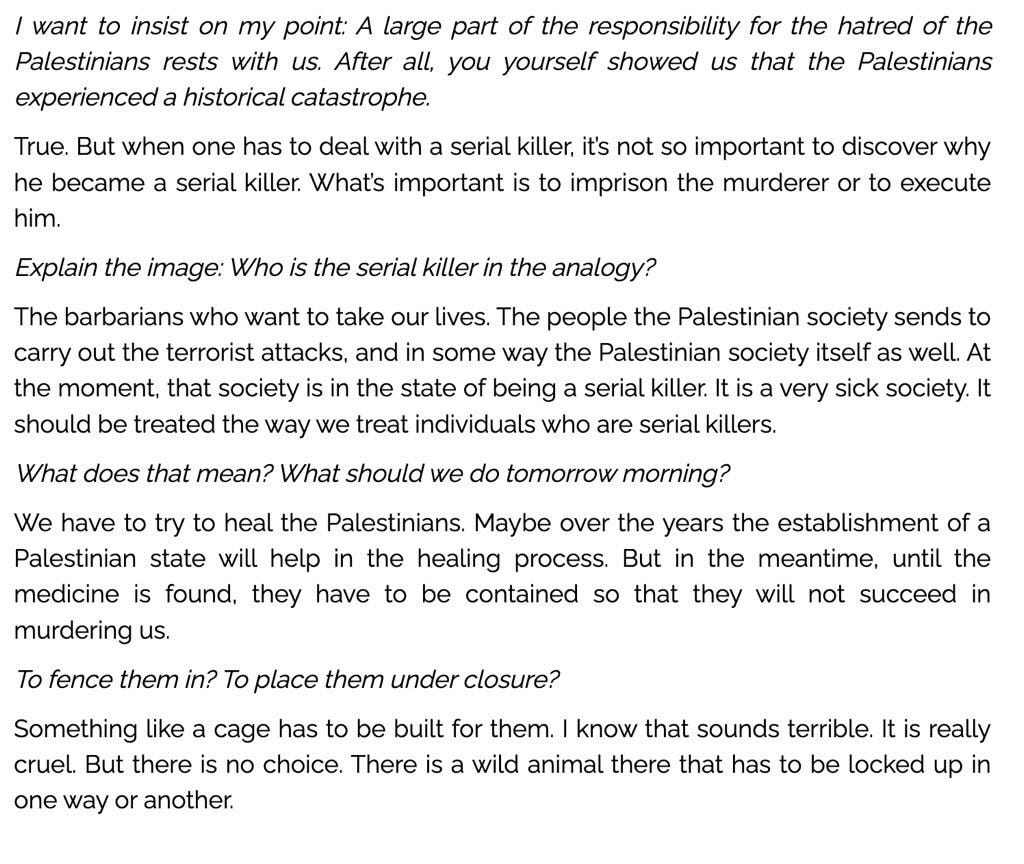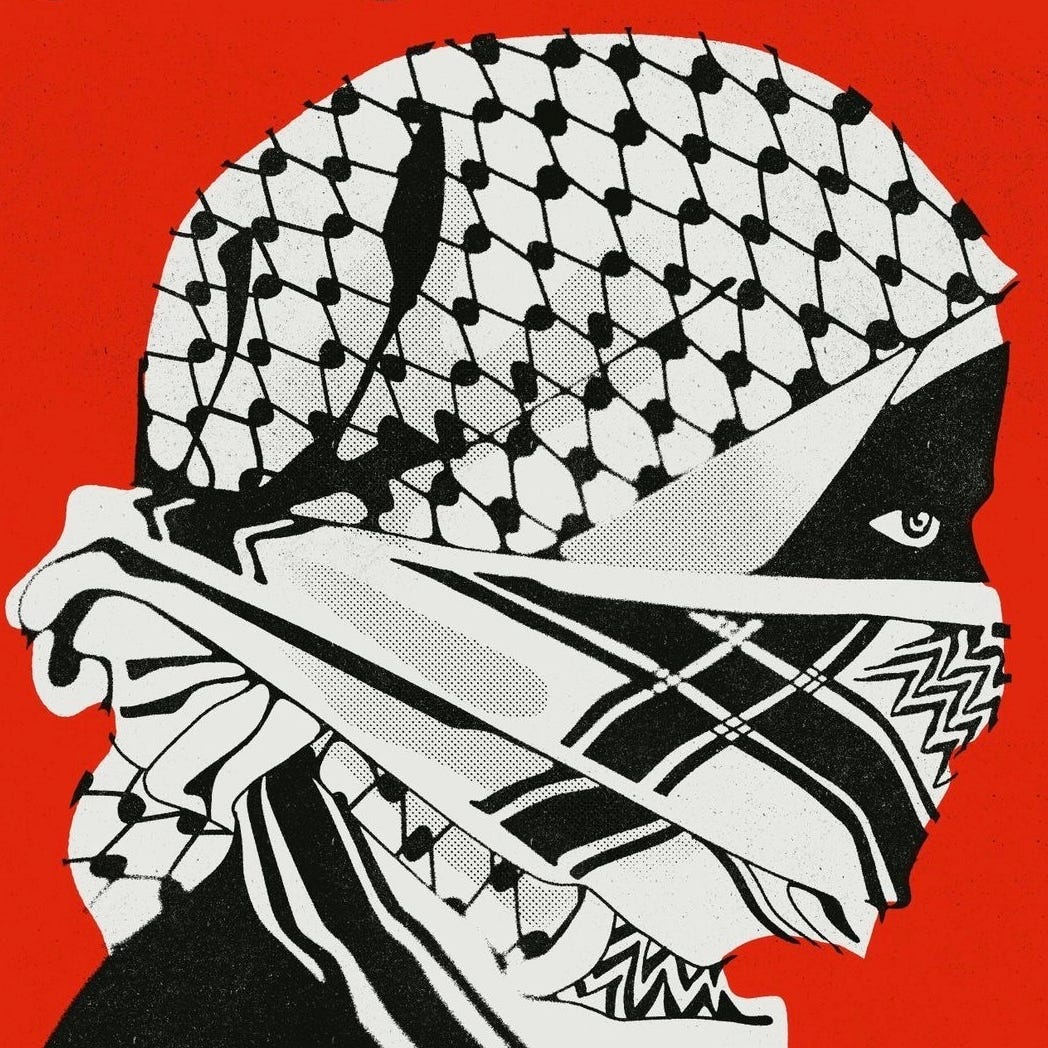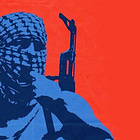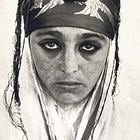The Prism of Humanisation: How Discourse Sanitises Resistance
Some disjointed thoughts on the limitations of Humanisation discourse, following a reading of Mohammad El Kurd’s ‘Perfect Victims’
A recent headline read: “Global media outcry after IDF kills Al Jazeera reporter who led Gaza terror cell,” reporting on the murder of Anas Al-Sharif–one of the six Al Jazeera journalists assassinated in a targeted Israeli airstrike. The claims have been vehemently denied by Al Jazeera and Anas himself before his death.
In the title, Anas is left nameless–reduced to another statistic in the over 270 Journalists killed by Israel. This number includes the 25-year-old photojournalist Fatima Hassouna, murdered along with six members of her family, and 24-year-old Hossam Shabat, who described feeling “hunted” by the IOF after being put on an Israeli hit list. These were the journalists either smeared as directly contributing to the “terror cells,” or at least in close enough proximity to be explained away as collateral.
“Our job is only to die,”.... “I hate the whole world. No one is doing anything. I swear I've come to hate this job.” About his surviving colleagues he wrote, “We've started saying to each other: "Ok, whose turn is it?…Our families consider us already martyred.” — Journalist Hossam Shabat
“This is my will and my final message. If these words reach you, know that Israel has succeeded in killing me and silencing my voice.” — Excerpt from Anas Al Sharif’s will
In Palestine, wills are written with the knowledge that premature death is inevitable. To be a journalist in Gaza is to know that a target has been placed on your back—that you will inevitably find yourself ‘hunted.’
Well-meaning journalists and activists stepped up to reject the heinous claim. Anas Al-Sharif was not a ‘terrorist’ engaged in armed resistance. He was simply a journalist—human, mournable, and grievable in every sense.
But what of the Palestinian who does resist? Does the universal right to life apply to them? What are the indicators of humanity? Is it limited to a press vest, or can it include the child wielding a slingshot and stone? Are Palestinian’s allowed to be complex individuals with political leanings, resentments, even anger, or must they exist only as passive victims of their colonised fate?
Humanisation discourse, the rhetoric often adopted by activists and journalists to advocate for Palestinian life, can sometimes trap us into the very narrative framework the Zionists seek to impose. We are expected to justify why the individual killed in cold blood is indeed mournable, beyond the simple fact that they are human. As Mohammad El Kurd observes, it is what led many to wave Shireen Abu Akhleh's American passport to western audiences to evoke an ounce of sympathy, as if her life alone was not enough to demand recognition.
This rhetoric, designed to act like shock therapy to evoke empathy from Western readers for the beating heart of another, has the power to mask, depoliticise, and sanitise victims of colonial aggression. It dictates which lives are acceptable to mourn, and which are not. In this article, we look at how this discourse can produce problematic, lasting consequences that ultimately hinder the cause.
Thou shalt not kill
Palestinian’s are expected to live in a decontextualised realm. A limbo, where anger and resentment spawn spontaneously, without motive or origin. Even the suffering civilian is suffering just because. Orientalist readings share a common deterministic thread; academics and politicians alike suggest that the innate ‘condition’ of the Arab makes conflict inevitable in the inexplicably ‘conflict-ridden Middle East’.
A cause with generational layers is reduced to a single moment. Often in a photograph, where the Palestinian is immortalised as either the teary-eyed civilian or the masked terrorist. Passages of the Palestinian’s story are excised and plastered on our screens, disjointed from the context that led us to this point. The narrative does not begin with the Nakba, nor the continuous massacres of Palestinian villages; it did not start with the ongoing building of illegal settlements atop homes in the West Bank, nor with the ongoing genocide of Gaza.
This binary makes resistance a baseless endeavour. It cannot be justified, because nothing in the Western gaze necessitates such a deeply personal, visceral response. Palestinians are not permitted to feel or act. Their narrative is deemed acceptable to international audiences only when they suppress their emotions and *bravely* turn the other cheek— ensuring their suffering can be packaged neatly for consumption. The one who lives outside of this box is unnerving; his humanity blurred the farther he steps from the frame.
Humanisation discourse perpetuates this framework, knowingly or unknowingly. By othering those who resist, omitting their names, and keeping them out of mournable bounds, this deterministic logic is reinforced. Their actions are judged as contrary to human nature and the pursuit of peace, even though it is only they who are able to break free from the imposed constraints and close the proximity between the coloniser and the colonised, while bringing the consequences of colonisation right back to the coloniser’s doorstep.
Depoliticisation of the right to resist
Humanisation rhetoric often seeks to make the Palestinian cause more palatable, but it does so at a cost: the cause is diluted, and the Zionist framework is legitimised. By selectively granting the attributes of “humanness” and mournability only to those who appease the Western eye, this discourse narrows the universal right to resist enshrined in international law into a privilege for a few, which is a Zionist aim.
Many anti-colonial figures have been subjected to similar treatment. Nelson Mandela, who led the ANC’s anti-colonial effort through orchestrating attacks on colonial infrastructure through bombings, shootings, and sabotage operations all from an underground cell, remained on the US terrorist list until he turned ‘peacemaker’; when he laid down his weapons and called on others to do the same. The same logic renders Martin Luther King’s nonviolence more palatable than Malcolm X's insistence on achieving justice ‘by any means necessary.’
The simple fact that ‘Humanness’ can be removed and reapplied speaks to the power it holds. It is a label strong enough to change the entire narrative on legitimate resistance and determine who within it is deemed out of the fold of humanity. When our arguments centre primarily on humanisation, we pour into the same mould that tells the colonised to ask the coloniser politely for change.
In this way, Humanisation-based arguments become tools to delegitimise resistance while preserving the very power structures that gave rise to it in the first place.
Race, interest, and the politics of empathy
Humanisation rhetoric is not so innocent. Consider the depiction of Ukrainian fighters, suicide operations, student Molotov makers, and armed volunteers; they are often portrayed as resilient heroes, their stories designed to evoke empathy for the “relatively civilised, relatively European,” “blue eye[ed] and blond hair[ed]” victims.
Race can serve as a convenient tool to sell imperial narratives, but the ultimate goal is strategic: to leverage public sentiment in pursuit of state interests. In Ukraine’s case, humanisation discourse is manipulated to appeal to subconscious biases, rallying popular support for a broader geopolitical agenda; namely, an attempt to weaken Russia.
Though a critique of this kind may seem linked to the racist logic of the colonial enterprise, there is substantial evidence to suggest that the demonisation of resistance is more often about protecting Western interests than about race itself. Russia’s communist challenge threatened US capitalist ambitions and challenged NATO expansion; the IRA threatened to end British rule. In West Asia, similar patterns prevail; preserving the Zionist project, maintaining military footholds, installing puppet governments, and controlling energy and trade corridors take precedence.
Here, violence is only condemned when the weapons used are not US-made. In other words, humanisation selectively sanitises violence to align with imperial priorities.
The myth of neutrality
Humanisation rhetoric frames itself as “neutral.” It is presented as the rational middle ground, but in reality, it is ideologically loaded.
Selective empathy is what shapes international perception, policy and intervention. It keeps advocacy confined within the boundaries of the Zionist framework, which seeks to sever Palestinians from genuine agency. It even guides the logic of prominent think tanks used to shape policy. Palestinian existence is only deemed legitimate when it complies with certain conditions; when it does not resist, when it accepts the occupier’s presence, and when it lays down its weapons.
The ‘perfect victim’
Within humanisation-based anti-colonial arguments, the only mournable victimhood is the passive kind. Only the innocent civilian who is completely disconnected from the context in which he lives can be wept for. Yet, this categorisation does nothing to preserve their lives, as to the occupiers there is no meaningful difference between the journalist wielding a camera and the masked young man wielding a gun. Both are obstacles to total control.
Humanisation discourse serves the rest of us. It is a discourse of convenience, giving journalists and advocates a way to sidestep harsh realities while maintaining an appearance of ‘civility’ for broader acceptance.
This selective framing underpins other problematic narratives, such as the outdated two-state solution. For such solutions to seem viable, there must be recognition of the humanity of “both sides”: this includes the illegal settler occupying a Palestinian home, and the Palestinian forced to grow up in a refugee camp.
True anti-colonial arguments must recognise that the humanisation of Zionist logic is fundamentally futile. Zionism is an inherently expansive ideology, with no fixed borders and a purposely vague constitution to permit continual growth at the expense of the colonised.
The Palestinian revolutionary must die
The Palestinian revolutionary is almost always depicted as a man. He is not one of the innocent women and children deemed worthy of protection. He is portrayed as having emerged without context, disconnected from reality. He is not the child who witnessed the murder of family members, or the one forced to grow up in a surveilled refugee camp. He is not worthy of anything above scepticism and hate. He is the one accused of ‘hiding’ behind the very civilians he has lived his life amongst.
Revolutionary acts, even those articulated by the pen or podium, are enough to justify the killing of these individuals. Nizar Banat, a political activist beaten to death by the Palestinian Authority, exemplifies this. His ‘crime’ was imagining a world far too distant from the colonial framework. Only those who accept these confines and operate within them are given permission to live.
“The world stands with you today because you have a rocket. Not ‘peace this, peace that”
“This Palestinian who we thought would end with the Nakba turned out to be capable. And it should be that if he goes towards strategies of liberation, then he is capable. Because then the whole world sympathises with him. Back then, the world sympathised with us when the Palestinian’s would smite. The world respects the strong. Yes, it sympathises with the weak, but it despises the weak and helpless. When we were weak and helpless, they hated us. When you are weak and defend yourself, they respect you. Don't listen to those that tell you, ‘well the world was against us, but when we chose the path of peace, the world stood with us.’ It’s not true.” — Nizar Banat
Humanisation discourse has become a linguistic weapon that confines journalists to work within the Zionist framework instead of challenging it. Seemingly compassionate, it functions as a mechanism of control, loosely cloaked in the guise of neutrality.
This is often the case when journalists, prior to offering any screentime to a Palestinian activist, ask whether they “believe in the legitimate right of Israel to exist,” or “condemn October 7th.” Only when stripped of political affiliations, emotion, and agency are they allowed to speak; when he condemns the suffering but not the perpetrator.
If we were really committed to humanisation, we would recognise the very human emotions that drive resistance. A desire for freedom, for better opportunities, and a brighter future. Real humanisation would acknowledge the political agency of the Palestinian man, not just his suffering, but his capacity to act.
Aymun Moosavi is a journalist & political analyst with a focus on anti-imperial resistance. Subscribe to her new newsletter, ‘The Fault Line’ above.
See also:









I have always found the criminalisation of the men of Hamas to be a disgrace. Why does anyone think they joined? There are a number of reasons I’m sure, and among them must be that:
(1) they’ve seen their relatives and friends killed by zionists;
(2) they’ve been orphaned by the zionist israelis, and the comradeship/family of being together in the resistance, calls to them;
(3) they are very brave men, and no-one would just give in to their country being brutally occupied;
(4) when your country is occupied, it’s everyone’s duty to try to get it back, ‘by any means possible;’
(5) in all countries that were occupied in WWII, resistance groups sprang up to fight against the occupiers, so why would Palestine be any different;
(6) unemployment in Palestine was very high;
(7) it is human nature to rebel against injustice;
(8) they may feel that if they’re killed fighting, at least they will then be with their already-martyred families;
(9) as The Palestinian Resistance, they are fighting for their people.
No doubt some would ask about what happened on 7/10/23, but my answer would be, as it always has been, that it was just another day in nearly eighty years of atrocities by the zionist israelis. The wonder to me, was that it hadn’t happened before. Anyone honest, would realise that if the Palestinians hadn’t been so appallingly treated, 7/10/23 would never have even taken place. What you sow, so shall you reap.
We come to the fact that many people are now pretty certain that 7/10/23 was allowed to happen. Netanyahu was warned twice apparently by Egypt, and also by the border guards at time of the breach of the wall. Nothing happened for hours, no army arrived - despite all the top-class surveillance equipment in place. They evidently thought that if they left the attack so that as much could happen as possible, they would then have a ‘good excuse’ to literally flatten Gaza. This is what has come about. Every time we have thought that the zionists couldn’t fall any lower, they have done so. In fact there is no excuse whatsoever for wreaking such devastation, for slaughtering, starving, maiming, and imprisoning men, women, and children. The men of the Palestinian Resistance are not criminals, they are human beings with human feelings and reactions. It’s about time people started thinking honestly about how they would react, if they were the subjects of an horrific occupation and then genocide. The zionist israelis are the criminals, and the instigators of everything that has happened.
"Their narrative is deemed acceptable to international audiences only when they suppress their emotions and *bravely* turn the other cheek— ensuring their suffering can be packaged neatly for consumption." Over the past week, I've watched Mohamed Hatem, a Palestinian gym influencer, appear in interviews with Jeff Nippard and Bradley Martyn, where he describes how, despite the ongoing genocide, he remains determined to continue writing his own story. Truly a remarkable story, and I urge anyone who hasn't seen his content to follow his journey.
I also want to preface this by saying I am glad his story was given the platform to reach larger audiences, but this quote really stuck out to me. While listening to the podcast, I couldn't help but feel that the suffering and trauma he has experienced over the past two years were being reduced to smaller, neutral, bite-sized portions for us to consume. Mohamed even, consciously, toning his language by describing forced displacement as relocation. There's a point in the Bradley Martyn interview at the 15:50 minute mark, where he asks who's doing the killing at the aid sites before quickly pivoting away once Mohamed tells him it's pretty obvious. This short clip encapsulates the entire coverage afforded to the Palestinians. Decontextualised suffering where man-made famines are given the dignity of impartial journalism.
Thoroughly enjoyed reading this, thank you.